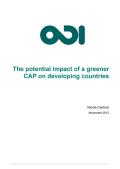Sustainable construction provides opportunities to address and alleviate several challenges and needs currently experienced in Gaza, including the increasing housing demand, limited availability of construction materials, insufficient energy and water provision, inadequate sanitation, as well as severe unemployment. The assessment analyses the feasibility, opportunities and challenges relating to sustainable construction in relation to the above mentioned needs and explores ways to promote green jobs.
The report summarizes the findings of a study on the challenges and opportunities for small business development and decent job creation in the waste management sector. Based on research conducted in three municipalities of Free State, South Africa, the report highlights the vulnerable situation of waste pickers and makes recommendations for better waste management. The research was commissioned by the ILO Free State SME Development Initiative and conducted by the University of Western Cape and the University of Johannesburg.
China’s economic rise has transformed the global economy in a number of manufacturing industries. This paper investigates whether China’s transformative influence extends to the new green economy. Drawing on the debate about how China is driving major economic changes in the world – the ‘Asian drivers’ debate – it identifies five corridors of influence and investigates their relevance for the wind energy industries. Starting with the demand side, it suggests that the size and rapid growth of the Chinese market have a major influence on competitive parameters in the global wind power industry. While Western firms have found ways of participating in the growth of the Chinese market, the government's procurement regimes benefit Chinese firms. The latter have made big investments and learned fast, accumulating production capabilities that have led to changes in the global pecking order of lead firms. While the combined impact of Chinese market and production power is already visible, other influences are beginning to be felt – arising from China’s coordination, innovation and financing power.

The phrase “Green Economy” was first mentioned in ‘Green Economy Blue Book’ by the British economist Pierre published in 1989. Green Economy promotes economic growth, instead of blocking it in the name of protecting the environment. It advocates changing extensive economic growth with the features of big investment, huge consumption, and serious pollution into intensive economic growth with the features of high efficiency, less resource-consuming, and less waste discharging and calls for harmony between economic and social growth and the proper load that nature can bear. As a new economic model aiming at harmonious development of economy and environment, Green Economy can fully satisfy the requirements of the scientific outlook on development of harmony and people first with energy saving and environmental protection as its goal.
